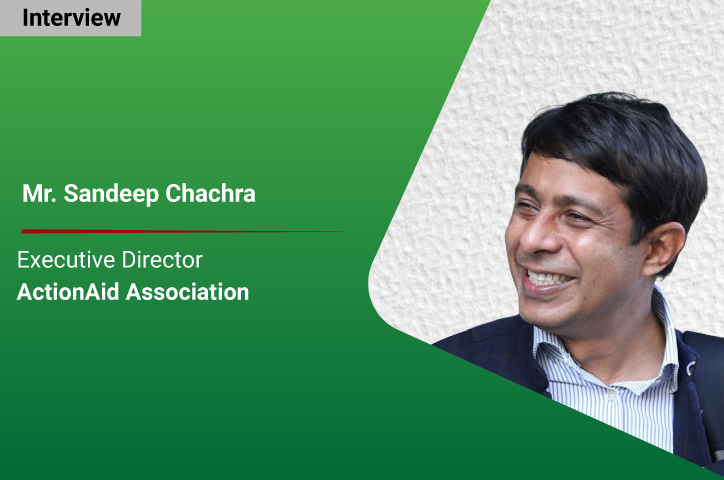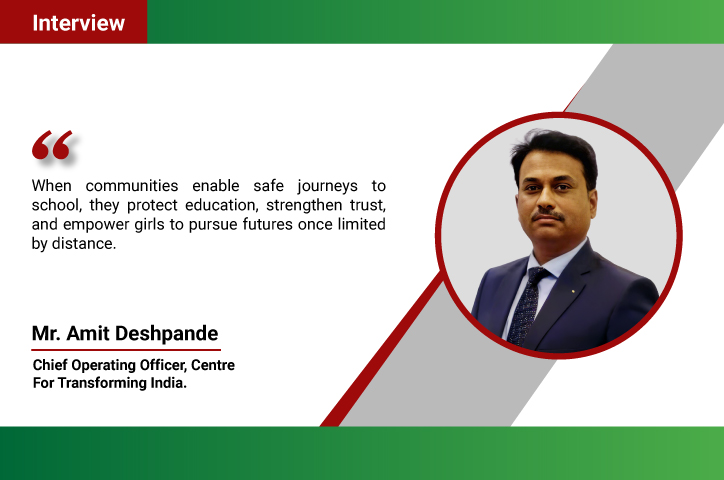Mr Sandeep Chachra is currently the Executive Director of ActionAid Association, the Co-Chair of the World Urban Campaign coordinated by UN-Habitat and the Editor, Agrarian South - Journal of Political Economy.
In this interview with TheCSRUniverse, Mr Chachra shares his insights into the impactful social work done by ActionAid Association over the last five decades. Further, he talks about his organisation’s mission of women empowerment through co-operative mechanism. Mr Chachra also shares his suggestions to lawmakers and CSR bodies towards making women empowerment initiatives more meaningful and effective.
Scroll down to read the full interview with Mr Sandeep Chachra
Q: Action Aid has been working for upliftment of marginalised sections of society for more than 5 decades now. What have been your key achievements in India?
A: We believe that grassroots movements and networks have the power to bring about resilient and transformative change in the communities in which they are located. However, amplifying this change requires us to build solidarity between those movements and networks at local, national and international levels. Our approach over the five decades has been of engaging with the government and scaling up our strategic partnerships across government bodies, civil society, media, research institutions and people’s organisations.
ActionAid Association helped set up various organisations which is working for specific communities. For example, the Bharatiya Muslim Mahila Andolan (BMMA) continued its mission of asserting citizenship rights for Muslims, especially Muslim women through various activities and a campaign to codify the Muslim Personal Law. Adivasi Janajati Adhikar Manch (AJAM), a platform for tribal organisations asserts rights of tribal communities and the Working People’s Charter (WPC), highlights and asserts rights of informal workers.
We believe that building leadership among the vulnerable communities, particularly of youth and women, is one of the touchstones for sustained social transformation and progress. Towards this end, in the last few years, we have mobilized over 50,0000 youth volunteers and organized 100 leadership schools across India.
We work in tandem with institutions established to protect human rights. Thus working with partners, networks of individuals, local administrations and the National Human Rights Commission (NHRC), we have been able to facilitate the liberation of more than 43,000 bonded labourers over the last two decades.
A few inspiring examples of women’s collective actions include the Basant Mahila Farmer Producer Organisation, in the Bundelkhand region of Uttar Pradesh, which has nearly 2,000 women farmers coming together to produce and market agricultural produce, and the Bihar Bauhuudeshiya Mahila Vikas Swavlambi Sahkari Samiti (BBMVSSS) Ltd.
We have also facilitated South-South dialogues and learning exchanges at all levels for local-national-international policy making on reducing suffering among marginalised communities, among them women.
The year- 2022, marks the 50th year of ActionAid’s work in India. In 1972 our interventions were in two states. Today we reach out to more than four million vulnerable and marginalised people across 200+ districts in 25 states and two union territories.
Q: You recently released a report on ‘Women Cooperatives’ in India. Can you please elaborate on the objective of the report and its key findings?
A: We published “Towards a Feminist Solidarity Economy: A Study of Women Cooperatives in Four States of India” as the outcome of a study that sought to assess the role of cooperatives in empowerment of women socially, economically, through control over own income, and politically, through voting, participation in local governance and political representation. İt, further, aims to investigate if co-operatives lead towards empowerment and change in the position of women in the community
Cooperatives and all forms of collective action enable the women to challenge patriarchal values in the work and domestic sphere. The autonomy of work afforded in collective and co-operative-owned enterprise allows movement towards resolving labour-capital contradictions that are seen in most private enterprise. And finally the solidarity created in collective enterprise helps sensitise women to resist other forms of discrimination and oppression that they see around them.
Q: One of the key areas of your work is women empowerment. What are the long-term projects that you have been undertaking on this theme over the last one decade?
A: As mentioned earlier, promotion of feminist approach and women’s leadership is central to all our work. We seek to empower women to take on leadership roles and for communities to understand the importance of feminist values. Our interventions in ensuring communities have rights to resources; seek to ensure that women’s right to property are recognized. In our interventions on livelihoods and worker’s rights we seek to focus on women in the world of work.
In collaboration with Women and Child Development Department of the Government of Madhya Pradesh, we are providing legal aid, access to services - medical, legal and psychosocial, to women survivors of patriarchal violence through Gauravi-OSCC in Bhopal. Since it was set up in 2014, Gauravi has supported more than 36,000 survivors of gender-based violence.
We are promoting leadership of young women in urban areas towards economic empowerment in urban areas. We have supported 2,800 young women and more than 400 leaders living in poverty in slums of India with greater dignity through more economic independence and control over their bodies, and their voices. We continue to work in partnership with trade unions to support young women workers. Across a four-year period ending in February 2019, we helped set up 896 collectives with a total membership of 43,910, spread across 32 cities in 15 states of the country. Prominent amongst the collectives of informal workers is the Paschimbanga Griha Paricharika Samiti (PGPS), an association of domestic workers with more than 5,000 members.
One of the most heinous crimes against women and adolescent girls has been the instances of acid attacks. The Orange Café and restaurant in Uttar Pradesh, provides livelihood opportunity, to acid attack survivors to embark on a new, transformational journey towards their socio-economic empowerment.
Q: Who are your key collaborators for funding your social projects and also for implementation of your projects? What have been your key learnings from your collaborations?
A: We collaborate with Government institutions to support effective implementation of laws and policies.
We have several corporate and institutional partners who support our work financially. These include Aditya Birla Capital Ltd, Adobe Foundation, Azim Premji Foundation, Care Today Fund, CISCO, Colgate Palmolive, E&Y Foundation, European Commission, HCL Foundation, IndoSpace, La Caixa Foundation, Loreal India, Motorola Solution Foundation, Siemens Ltd, UNFPA, UNHCR and UNICEF.
We also collaborate with Universities to generate knowledge and research on issues that are of import from the view of the masses.
Q: What according to you are the key areas where work is still required to empower women in India?
A: While India has taken some measures on human development, its global standing on gender equality remains low. India’s ranking in the Global Gender Gap Report, commissioned by the World Economic Forum, ranks India at 135 out of 146 countries. India is the worst performer in the world in the “Economic participation and opportunity” (ranked 143) well as “health and survival” (ranked 146) sub-index. The deep-rooted gender inequality in Indian society manifests itself in several discriminatory beliefs and practices towards women, girls and gender minorities.
Some key areas where work is still required to empower women in India are:
- Empower women so they can individually and collectively assert their social and economic independence.
- Address issues of patriarchy and changing mindsets amongst the youth and especially men and boys.
- Strengthen a gender just and responsive government machineries from local, state and National levels - After the 2012 Nirbhaya gang rape case, the government responded quickly by constituting the Justice Verma commission and the Criminal Law, Amendment Act in 2013. But the ground situation for women, girls and gender minorities in terms of accessing justice seeks remains weak. Quicker response is needed through effective implementation of laws like Dowery Prohibition Act of 1961 (Amended in 2018), The Protection of Women from Domestic Violence (PWDVA, 2005), Pre Natal Diagnostic Techniques Act (PCPNDT Act), The Muslim Women (Protection of Rights on Marriage) Act, 2019 — Triple talaq, Prevention of Atrocities Act, POA1989 and Prevention of Women Sexual Harassment (POSH, 2013).
- Investment in community social justice networks/ Watch groups/ Social justice defenders to support and advance women’s rights.
Q: What are the main challenges in implementing projects meant for women empowerment in India?
A: Policies, laws and legislations are not enough to bring in changes at the societal/ community/ individual level that would ensure an equal society – a major reason of inequality, injustice and exploitation is the social stratification and unequal power relations that are so deeply rooted in our beliefs, attitudes and practices. Therefore, consciously we give stronger emphasis on changing social norms, cultural belief and practices that are barriers to women empowerment through our recent campaigns, programmes and communication efforts.
Another major challenge is the scale of inequality and exclusion of women within the country. Reaching the most remote areas in the time frame and limited resources is a task. Social change and rights assertion is a gradual and time consuming process. Many a times the funds are for fixed term. Additionally, Resources/funds are sometime tide for a certain task, as well as some donor prefers a specific geographical area, thus limiting impact of our work.
Q: Corporates are also investing a lot of their CSR money into women empowerment and their livelihood. How do you see it impacting the overall scenario over the last 10 years?
A: CSR funds towards women empowerment and their livelihood has been laudable. Educational, Economic and Occupational Women empowerment has resulted in empowering women with knowledge, skills and confidence to pursue their careers, earn their own livelihoods and contributed to their household income.
It has empowered women to access markets and market spaces that have been dominated by men, especially in the agriculture sphere. The collective empowerment has resulted in negotiating public spaces and accessing rights accrued to them as citizens. This over the years, will lead to enhance the social, political and economic status of women in India.
All of this will also have direct impact on the instance of out-migration/distress migrations, help address issues of child malnutrition/ child marriage which is rampant and above all address issues related to violence, abuse and exploitation of women and young girls.
Q: Since CSR is increasingly becoming more impact driven, what are your suggestions to the corporates towards making their CSR spent on women empowerment more effective?
A: There is an urgent need to invest into the much needed structural transformation of society and the economy, to ensure women’s empowerment and achieve the desired goal of gender equality. This calls for support to women to build collectives, so they can lead the structural change needed. CSR investments should flow into a diverse range of women’s collectives, including self-help groups, farmer producer companies, cooperatives, trade-based associations and unions, village and mohalla (locality) groups.
Q: Any suggestions to lawmakers so that policies become more conducive towards bringing real change in society via women empowerment?
A: India has many progressive laws that have been put in place for protection and promotion of women’s rights. The real challenge lies in the implementation and awareness of such legal rights. Having said that, there are still some laws that could be passed and some actions can be taken.
Firstly, we need a law that recognises women farmers. Despite that women take up a large majority of farm-related work, they do not get the recognition as farmers and owners of farm land and resources. The status of women farmers needs to be given a solid legal foundation to break the patriarchal assumption that the male members of agricultural families are the farmers.
Secondly, the rights of single women too need to be enshrined in law, as too often rights are vested in male members of the family, and while that is in itself unfair, in the case of single women, the deprivation of rights is often complete, including physical dispossession.
Finally, we need to recognize the continuum of unpaid-underpaid-paid work that all women live in the world of work. We need a national campaign celebrating women in the world of work, calling for strict implementation of the laws of equal pay, dignity and safe and conducive work space, safe cities and most importantly a call for men and boys to share in the care work at home. Nothing short of a high-profile campaign will change the patriarchal mend sets that plague us and our societies.
Another key policy recommendation is to law makers would be to ensure that CSR mandates support for a long term (minimum 10 years) than the current stipulated minimum 3 years funding. Long term support is required to bring about any real change. Second, CSR should support adequate implementation costs (overheads, staffing etc) not only for core project team but also for other key organisational people and leadership who ensure effective implementation, high standards and statutory compliances for the project and the organisation which is very critical while implementing CSR projects.


















